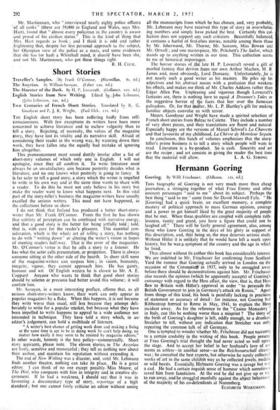Short Stories
THE English short story has been suffering badly from self- consciousness. With few exceptions its writers have been more concerned to achieve literature and to eschew vulgarity than to tell a story. Rejecting, of necessity, the values of the magazine story, they have lost its vitality and its narrative skill. Afraid of considering their reader in the wrong way, by watering down their work, they have fallen into the equally bad mistake of ignoring him altogether.
This pronouncement must sound dottily insular after a list of short-story volumes of which only one is English. I will not apologise, since they all confirm it. To write literature must always be an unsatisfactory aim because posterity decides what is literature, and no one knows what posterity is going to fancy. It Is far safer to tell a good story, a story which the writer is impelled to write in his own way and at the same time wants to share with a reader. To do this he must not only believe in his story but make the reader want to know what happens next. In this vital part of the story-teller's business the magazine-writers have usually excelled the serious writers. This need not have happened, as the collections before us show.
I do not think that Ireland has produced a better short-story- writer than Mr. Frank O'Connor. From the first he has shown that subtlety of perception can be combined with narrative energy, and that a good story is the better for being artfully told ; told, that is, with care for the reader's pleasure. This essential con- sideration, which is the whop art of telling a story, has nothing to do with " writing down " or altering the writer's vision in hopes of meeting readers half-way. That is the error of the magazines. Mr. O'Connor's virtue is that he iells a story to a listener. He has what the actor calls presentation, or projection. There is always someone sitting at the other side of the hearth. In sheer skill none of the magazine-writers can surpass him ; in vision, humanity, integrity, vigour, they cannot approach him. He has gaiety, humour and wit Of English writers he is closest to Mr. A. E. Coppard Anyone who wants to think that good short stories should be solemn or precious had better avoid this volume: it will confute him.
Mr. Saroyan, in a most interesting preface, affirms that, as all serious short-story-writers know, their work can only appear in popular magazines by a fluke. When this happens, it is not because they write worse than usual, still less because they attempt deli- berately to write for a popular market, but because what they have been impelled to write happens to appeal to a wide audience not interested in technique. They have told a story which, in an- editor's judgement, can hold a multitude of listeners.
"A writer's best chance of getting work done and making a living at the same time is apt to be in doing work he can't help doing, no matter how easily it may seem to be resisted by magazine editors." In other words, honesty is the best policy—commercially. Short story aspirants, please note. The eleven storiesi in The Assyrian are lively, sensitive and resourceful ; they tell us nothing new about their author, and maintain his reputation without extending it. The end of New Writing was a disaster, and, until Mr. Lehmann finds another theatre, nothing can take its place. He is a great editor. I can think of no one except possibly. Miss Moore, of The Dial, who compares with him in Integrity and in creative dis- cernment. If he had a weakness, I should say that it was in favouring a documentary type of story, reportage of a high standard ; but one cannot fairly criticise an editor without seeing
all the manuscripts from which he has chosen, and, very probably, Mr. Lehmann may have received this type of story in overwhelm. ing numbers and simply have picked the best. Certainly this col- lection does not support apy such criticism. Beautifully balanced, it contains a hatful of first-class stories, notable among them those by Mr. Isherwood, Mr. Thorne, Mr. Sansom, Miss Bowen and Mr. Orwell ; and one masterpiece, Mr. Pritchett's The Sailor, which stands up to anything written in our time. This collection seem to me of historical importance.
The horror stories of fiat late H. P. Lovecraft reveal a gift of morbid fantasy that derives from our own Arthur Machen, M. R James and, most obviously, Lord Dunsany. Unfortunately, ,,he is not nearly such a good writer as his masters. He piles up his adjectives and his abstract nouns with a profusion that weakens his effects, and makes me think of Mr. Charles Addams rather than Edgar Allen Poe. Unpleasing and vigorous though Lovecraft's fantasies are, there is nothing here to equal A Dreamer's Tales or the suggestive horror of tip faces that leer over the Jamesian palisadoes. Or, for that neafter, Mr. L. P. Hartley's gift for making familiar objects convulse us with terror.
Messrs. Goodyear and Wright have made a spirited selection of French short stories from Balzac to Colette. They include a number of very short pieces, and their translations are fluent and natural. Especially happy are the versions of Marcel Schwol's La Charrette and that favourite of my childhood, La Chevre de Monsieur Seguin.
In conclusion, this batch of volumes emphasises that the story- teller's prime business is to tell a story which people will want to read. Literature is a by-product. So is cash. Sincerity and art are the recipe ; and art consists in giving the reader the best time


































 Previous page
Previous page